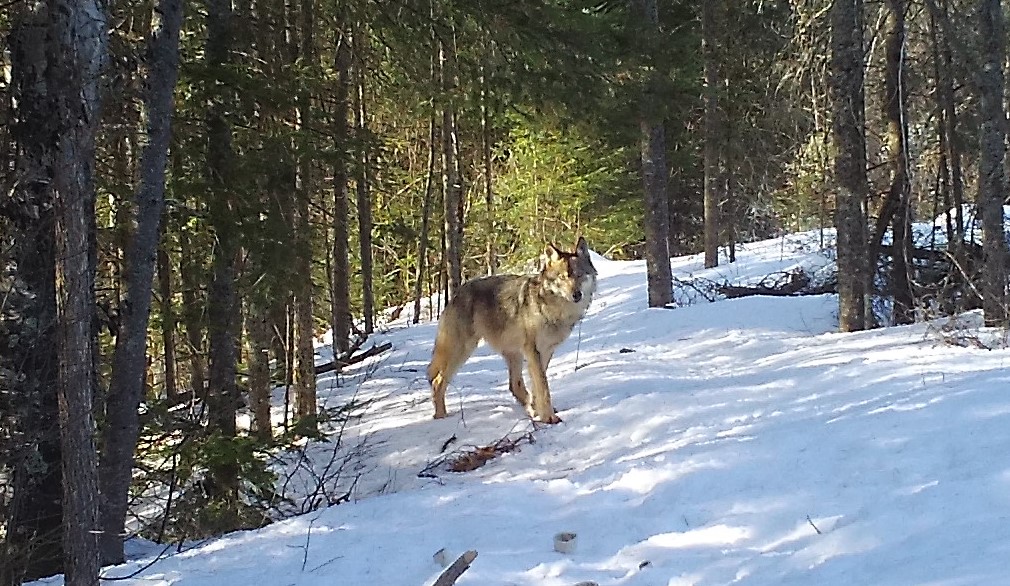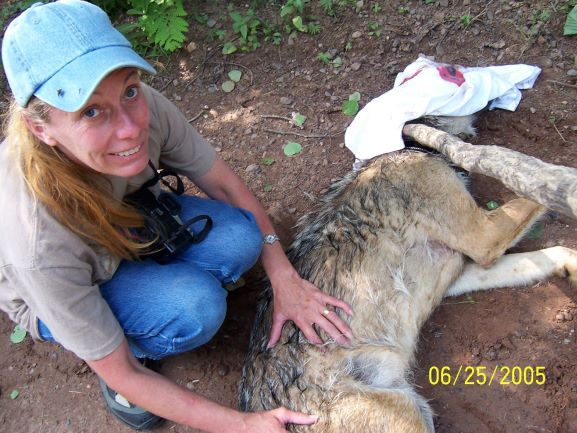EDITOR’S NOTE: Nancy Warren is Executive Director of the National Wolfwatcher Coalition and a resident of the western Upper Peninsula who has advocated on behalf of wolves for nearly three decades.

After AFA was named to the new Advisory Council, we turned to her for insight from her decades of experience and activism for wolves, as well as her service on two earlier wolf advisory councils.
The newly formed Wolf Management Advisory Council is the third group in approximately the last 15 years convened by the Department of Natural Resources. It differs in one important respect: it will be the first to convene after gray wolves were stripped of protection under the federal Endangered Species Act and turned over to state management. The stakes could not be higher.
Credits, Nancy Warren | Above: a favorite image from trail cam on her property. Below: helping collar a wolf in WI, 2005.
There will be tremendous pressure to have a U.P.- wide hunting/trapping wolf season, even though there is no scientific need for one and it is not supported by the public.

You were on the past two councils (2008 and 2015) considering wolf management. What is Attorneys for Animals role?
NW: The role of AFA will be critical. Past memberships represented a diversity of Michigan interests in wolves and included Upper Peninsula and Lower Peninsula residents. Organizations were selected to ensure the views of all Michigan residents would be represented in a fair and effective manner. Hunters represent only 6% of Michigan’s population, trappers less and those who hunt with dogs, even less. Yet these interests are overrepresented on the 2021 council, holding two seats. The person representing agriculture interests not only supports the hunting of wolves, but he participated in the 2013 wolf hunt. AFA is the only organization representing wolf advocacy.
Talk about wolf-related conflicts.
NW: The guiding principles adopted by the council November 2006 state, “In recent years, Michigan wolves have been killed on a case-by-case basis by government personnel for the purpose of addressing wolf-related conflicts. All reason suggests wolves will continue to be killed for this purpose. The DNR can use hunters for this management need. Satisfying, in part, the interest to recreationally hunt would be an outcome of killing wolves to address wolf-related conflicts.” The intent was that a hunter or trapper, rather than a government agent, could be used to resolve a conflict on a particular farm. Instead, DNR created large zones, which included national forests of prime habitat when they established the 2013 wolf hunt and led the public to believe a wolf hunt was needed to resolve conflicts. Research suggests that when there is a conflict, it must be resolved timely, not five months later through a wolf hunt.
What do the majority of Michiganders think about a recreational hunt?
NW: In 2014, voters overwhelming rejected two ballot proposals, making it clear that the public does not support wolf hunting and trapping.
AFA is the only organization representing wolf advocacy.
You served on two councils. Can you talk about the differences between the two?
NW: The advisory council for the 2008 plan was much different than the 2015 update. First, the Roundtable (council) which formed in 2006 did not write the plan, the council developed the guiding principles for the plan after the DNR completed a public opinion survey, met with focus groups and held public meetings. Between, June and September the council, which was comprised of 20 organizations, met for 10 days reviewing scientific data, survey responses and reaching consensus on each issue except the recreational hunting of wolves. By contrast, for the 2015 update, the council met only twice. It was loosely organized, with DNR facilitating the meetings, rather than an outside facilitator. The council was not asked to reach consensus, rather, it was a top-down process, with DNR requesting opinions and concerns.
Has the DNR implemented according to plan?
NW: MI DNR made many commitments in the 2008 plan which were reaffirmed in the 2015 update, but they have failed to follow through on several:
- Education/Information – Little has been done to counter misinformation, involve the public in wolf related projects, positive wolf experiences or any other actions to improve tolerance for wolves.
- Providing information – Over the past ten years, this has become worse, not better. At one time, a phone call or email to DNR was sufficient to receive basic information about predation. Now, a formal Freedom of Information Act request must be submitted, DNR often requests an extension of time and most often requests payment before information is released; when received, it usually has redactions. Even asking for the selection process and correspondence related to the appointment to the current Wolf Advisory Council required a formal request, which was done March 15, 2021, but still not received (DNR requested an extension to April 6).
- To date, MI DNR has not recommended a modification of law, at the State level, to make penalties for illegally killing a wolf commensurate with other highly valued species – the penalty for illegally killing a turkey is still greater than the illegal killing of a wolf.
Any final thoughts?
NW: There will be tremendous pressure to have a U.P.-wide hunting/trapping wolf season, even though there is no scientific need for one and it is not supported by the public.
Note: By law, the Council includes:
(a) The director of the department or his or her designee, Dan Kennedy
(b) One member representing an organization that promotes conservation, Amy Trotter, Michigan United Conservation Clubs
(c) One member representing organizations that promote hunting or fishing, Mike Thorman, Michigan Hunting Dog Federation
(d) One member representing a tribal government, Miles Falck, Great Lakes Indian Fish and Wildlife Commission
(e) One member representing agricultural interests, Dick Pershinske
(f) One member representing an animal advocacy organization, Bee Friedlander, Attorneys for Animals
